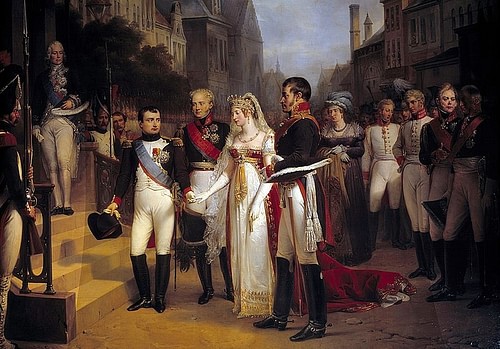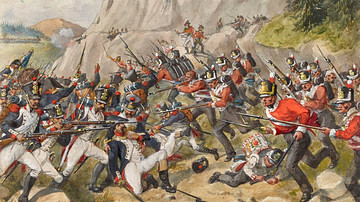
The Continental System was a major blockade of British trade imposed by French Emperor Napoleon I from 21 November 1806 to 11 April 1814. It was designed to cripple the British economy, thereby forcing Britain out of the Napoleonic Wars (1803-1815). However, the blockade proved difficult to enforce and ended up negatively affecting France, contributing to Napoleon's eventual downfall.
Napoleon considered Britain to be his most dangerous enemy; indeed, the British had organized and financed most of the coalitions against France during the French Revolutionary Wars and Napoleonic Wars. Since the destruction of the French fleet at the Battle of Trafalgar (21 October 1805), Napoleon could not hope to invade the British Isles directly, leading him to impose a blockade instead. The Continental System was meant to deny Britain access to trade with continental Europe. Napoleon envisaged that this would paralyze the economy of Britain, which he often referred to as a "nation of shopkeepers", and would lead to widespread social upheaval across the British Empire. Furthermore, Napoleon meant for the Continental System to bolster French hegemony on the continent, since French industries could fill the gap in the market left by the British.
However, the Continental System did not have the effect that Napoleon desired. Although their economy took an initial hit, the British compensated for the loss of continental commerce simply by opening new markets in other parts of the world. Meanwhile, industries on the continent were hit hard, deprived of the raw materials provided by British merchants. Smuggling became rampant, as Napoleon's own customs officials took bribes to turn a blind eye to the black market of illegal British goods. Since he lacked a strong navy, it was nearly impossible for Napoleon to enforce his own blockade. His attempts to force other nations to comply led to several new conflicts, including the Peninsular War (1807-1814) with Spain and Portugal and his disastrous invasion of Russia (1812), both of which contributed greatly to his downfall. Napoleon refused to admit the failure of the Continental System, and it remained in place until his first abdication in April 1814.
Origins
Beginning in 1688 at the onset of the War of the Grand Alliance, Britain and France became locked in a rivalry that would last for over a century and would take form in multiple wars. This period of perpetual Anglo-French conflict, referred to by some historians as the Second Hundred Years War (1688-1815), included several instances of economic warfare, as each nation tried to weaken the other through means of trade restriction such as tariffs and blockades. In an age of mercantilism and colonialism, the key to an empire's success was the accumulation of wealth, often through trade. It was common, therefore, for nations to target the colonial holdings and commerce of their rivals while promoting their own trade. Since this kind of warfare had been going on long before Napoleon's rise to power, scholar Alexander Mikaberidze asserts that Napoleon's Continental System was not as irrational as some have claimed but was rather a continuation of traditional policies (228).
Indeed, the first act of economic warfare during the French Revolutionary and Napoleonic Wars came not from France, but from Britain. Upon joining the war against France in 1793, the British implemented a blockade of French ports that lasted until 1799, during which time maritime activity along the French coast was monitored and limited. The French were unable to respond in kind until December 1800, when they controlled enough of Western Europe to deny the British access to ports from Norway to Naples. This embargo was worsened by the participation of Russia, whose emperor, Tsar Paul I (r. 1796-1801) had become disillusioned with Britain's actions during the War of the Second Coalition (1798-1802) and sought to lessen British power. Paul detained 300 British vessels that were docked in Russian ports, stopped all payments to British merchants, and seized British goods and warehouses.
Tsar Paul also organized a League of Armed Neutrality for the purpose of protecting free trade; consisting of Russia, Sweden, Denmark, and Prussia, the League protested the British navy's practice of searching neutral shipping for French contraband. The British considered the League to be allies of France, leading the Royal Navy to bombard the Danish fleet in the First Battle of Copenhagen. This attack, along with the assassination of Tsar Paul I in March 1801, led to the collapse of the League of Armed Neutrality. The French embargo ended a year later when the Treaty of Amiens ended open hostilities between Britain and France. The combined French and Russian embargos revealed Britain's dependence on certain continental goods including grain, hemp, and naval supplies (Mikaberidze, 117). Continental Europe also accounted for 40% of Britain's total exports, meaning that such a blockade had the potential to hurt Britain's economy. But the Franco-Russian embargo of 1800 did not last long enough to noticeably affect the British economy and was badly coordinated and executed. It was, however, only the precursor of the more substantial embargo that was to come.
Berlin & Milan Decrees
Hostilities between Britain and France resumed in May 1803, with the breakdown of the fragile Treaty of Amiens. The British wasted no time organizing and financing new coalitions against Napoleon, which at various points involved Austria, Prussia, Russia, Sweden, Portugal, Spain, and others. In the early years of the Napoleonic Wars, the French army steamrolled across Europe, defeating every army sent against it; Napoleon defeated an Austro-Russian force at the Battle of Austerlitz (2 December 1805), obliterated the Prussian army at the Battle of Jena-Auerstedt (14 October 1806), and crushed the Russians at the Battle of Friedland (14 June 1807).
By the time of the Treaties of Tilsit in July 1807, Napoleon ruled most of Western and Central Europe, either directly or through French allies and client states. However, while the French were undeniably dominant on the continent, they were simultaneously inferior on the seas; the destruction of the French fleet at Trafalgar meant that the French could no longer hope to challenge Britain at sea or attempt an invasion of the British Isles. With France in control of the land, and Britain as master of the seas, neither side was yet in a position to defeat the other militarily; instead, each once again looked to cripple the other through economic pressure.

On 16 May 1806, the British government issued an Order-in-Council calling for a blockade of the entire European coastline from Brest to the Elbe River. Napoleon retaliated six months later when he issued the Berlin Decree from the captured Prussian capital. The decree, which formed the basis of the Continental System, began by announcing that "England does not admit at all the law of nations followed universally by all civilized people", meaning that Britain's opponents had the "natural right to oppose the enemy with the same arms he uses" (Roberts, 427). The articles, drafted by French foreign minister Charles Maurice de Talleyrand, included:
- The British Isles are in a state of blockade.
- All trade and correspondence with the British Isles is forbidden.
- Every British subject, of whatever state or condition he may be…will be made a prisoner of war.
- All warehouses, all merchandise, all property…belonging to a subject of England will be declared a valid prize.
- No ship coming directly from England or the English colonies or having been there since the publication of the present decree will be received in any port.
- The present decree shall be communicated…to the kings of Spain, Naples, Holland, and Etruria, and to our allies, whose subjects, like ours, are the victims of the injustice and barbarism of the English maritime laws.
(Roberts, 427; napoleon.org).
It was an uncompromising decree, meant to prevent the British from trading at any continental port. Napoleon believed that, if he could starve the British of continental trade, he could cripple Britain's economy, which would result in social upheaval across the British Empire and put pressure on Parliament to make peace. The British responded in November 1807 with additional Orders-in-Council that called for the seizure of neutral vessels trading at French ports; henceforth, any neutral parties wishing to trade with France had to sail to Britain first to obtain a special license. Napoleon responded in kind with the Milan Decrees of November and December 1807, which also attacked neutral shipping, mandating that any ship that stopped at British ports or consented to search by British vessels was liable to be captured by France or its allies as a prize. These attacks on neutral shipping would impact American trade and helped lead to the War of 1812 between Britain and the United States.
Impact on Britain
Napoleon's declaration of the Continental System was initially laughed off by the British government, who believed that the French emperor had no means of enforcing it. "What was the use of talking of blockading Great Britain," they scoffed, "when [Napoleon] had scarcely a ship on the ocean to enforce his order? He might as well have talked of blockading the moon and possessing himself of all the lunar influence" (Mikaberidze, 235). Although the blockade ultimately failed, it would be false to claim the Continental System had no adverse effect on Britain, especially early on. By the end of 1807, the Continental System had been joined by Russia, Denmark, Prussia, Holland, Italy, Naples, and Napoleon's German Confederation of the Rhine; in 1809, Austria would also be compelled to join.

Since one-third of Britain's direct exports and two-thirds of its re-exports went to continental Europe, this did have a negative effect. Between 1808 and 1814, the bullion in the Bank of England declined from £6.9 million to £2.2 million. In 1810, Britain was hit with bad harvests, which, compounded by the Continental System and by hostile relations with the United States, led to an economic depression in 1811-1812. Unemployment and inflation increased, and several leading British banks were forced to close. This did lead to widespread protest from the lower classes, though it was nowhere near the magnitude that Napoleon had desired, and the middle and upper classes continued to support the government and the war effort.
But despite minimal economic hardships, British trade managed not only to survive but to flourish. Denied access to the markets of Europe, British merchants were forced to open new markets in Asia, Africa, and South America; the latter region became a favorite region for British merchants and would become one of the most significant markets for British trade. These new markets led to a rise of total British exports from an average of £25.4 million per annum between 1800-1809 to £35 million between 1810 and 1819. Overall, this made up for any financial loss that the Continental System dealt to Britain, allowing the British to continue the fight against Napoleonic France.
Impact on the Continent
The Continental System had a much more negative impact on the Napoleonic Empire and its allies. Merchants and manufacturers across the continent faced a shortage of both raw materials and highly sought-after luxury goods, including cotton, sugar, dye, and coffee. Such items could only be procured by paying the high prices imposed by imperial tariffs or by engaging in the risky practice of smuggling. This led to a decline in the economies of areas that depended on trade such as the cities of the Hanseatic League and Holland. Louis Bonaparte, the king of Holland and Napoleon's brother, refused to enforce the Continental System due to the negative effect it was having on his country, leading Napoleon to dethrone him and annex Holland directly into the French Empire. The blockade also negatively impacted the industries in several European regions. The Italian industries of cotton printing, tobacco factories, corn mills, and silk industries came close to failure while Norway saw an abrupt decline in its timber and iron industries. One-third of all Portuguese businesses ended up closing, while in Spain, blockade and war destroyed most industries (Mikaberidze, 239).
Napoleon had expected short-term hardships for European trade and businesses, a sacrifice he had been willing to make for the defeat of Britain. Indeed, part of the purpose of the Continental System had been to encourage French industries to replace those of Britain, which would foster France's position as the political, economic, and military center of Europe. However, the loss of neutral trade hit French industry hard as well; the port cities of Bordeaux, Marseille, and La Rochelle were greatly crippled by their loss of access to colonial goods, and the price of staple crops rose sharply.
Mikaberidze notes that the number of sugar refineries in Bordeaux dropped from 40 in 1789 to only 8 by 1809, and more than two-thirds of the 1,700 textile enterprises of Paris closed down (238). Some French industries, such as wool and silk, saw short-term growth, but their markets became displaced as Europe became further engulfed in the Napoleonic Wars. Working-class citizens and French businessmen blamed Napoleon's regime for these economic misfortunes. Napoleon encouraged his scientists to research new alternatives to colonial materials, which led to the discovery that sugar beet and indigo dye could be produced in France. But this was not enough to make up for the loss of colonial imports.
Smuggling became rampant during this period, with more than 800 smuggling vessels operating in the Mediterranean in 1811 alone. Heliogoland, off the west coast of Denmark, and the Ottoman-occupied Thessaloniki became popular entry points for contraband goods into the continent; through smugglers, Britain was able to export £10 million worth of goods into Southern Europe in 1809 (Mikaberidze, 236). Napoleon tried to combat this by increasing the number of customs officials in the ports, but these officials were prone to bribes and often ignored the rampant smuggling. In 1810, Napoleon attempted to lessen the effects of smuggling by passing the Saint-Cloud Decree, which opened the southwest of France and Spain to British trade and reopened France to American trade, but the black market of British goods continued, and even Napoleon's closest supporters and family members engaged in it. Joachim Murat, Napoleon's brother-in-law and king of Naples, turned a blind eye to smuggling in his kingdom while Marshal André Masséna made over 3 million francs off the black market while stationed in Naples. Even Napoleon's wife, Empress Joséphine de Beauharnais, regularly purchased contraband British goods.

However, as bad as the economic effects were on the Napoleonic Empire, the real trouble came when Napoleon tried to enforce the Continental System. Since Napoleon had no navy with which to blockade Britain's ports, his Continental System would only work if every European nation participated in closing their ports to British commerce. The reluctance of Portugal to do so in 1807 threatened the success of the entire blockade. Therefore, to force the Portuguese to comply with the blockade, Napoleon invaded, kicking off the costly Peninsular War. His attempts to enforce the blockade also led Napoleon to invade and occupy the Papal States and the Illyrian Provinces in 1809 and the Hanseatic cities in 1810. Most consequentially, Napoleon's desire to enforce the Continental System led to his invasion of Russia in 1812, after Tsar Alexander I of Russia (r. 1801-1825) left the blockade and reopened his ports to British trade. Napoleon's invasion of Russia proved disastrous, resulting in the destruction of his Grande Armée, and marking the start of his downfall.
Conclusion
Napoleon's Continental System was intended to both paralyze British power and strengthen France's continental hegemony, but it failed to achieve either goal. What little effect it had on Britain's economy was soon negated when British merchants opened new markets across the globe; the economic depression experienced in Britain in 1811-1812 was caused as much by the previous season's poor harvests and the impending war with the United States as it had been by the Continental System. Moreover, France's position as the economic center of Europe was undermined by struggling industry and the smuggling of contraband goods. Napoleon's futile attempts to enforce the Continental System through force of arms led to his most severe military defeats and, ultimately, to the loss of his empire. Overall, the system led to deindustrialization in many parts of Europe and put some continental industries 20 years behind those of Britain. Indeed, many British industries would not face serious continental competition until the end of the 19th century.







